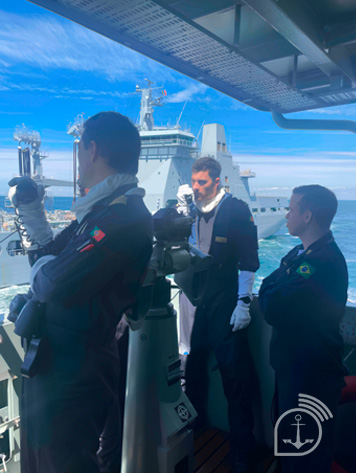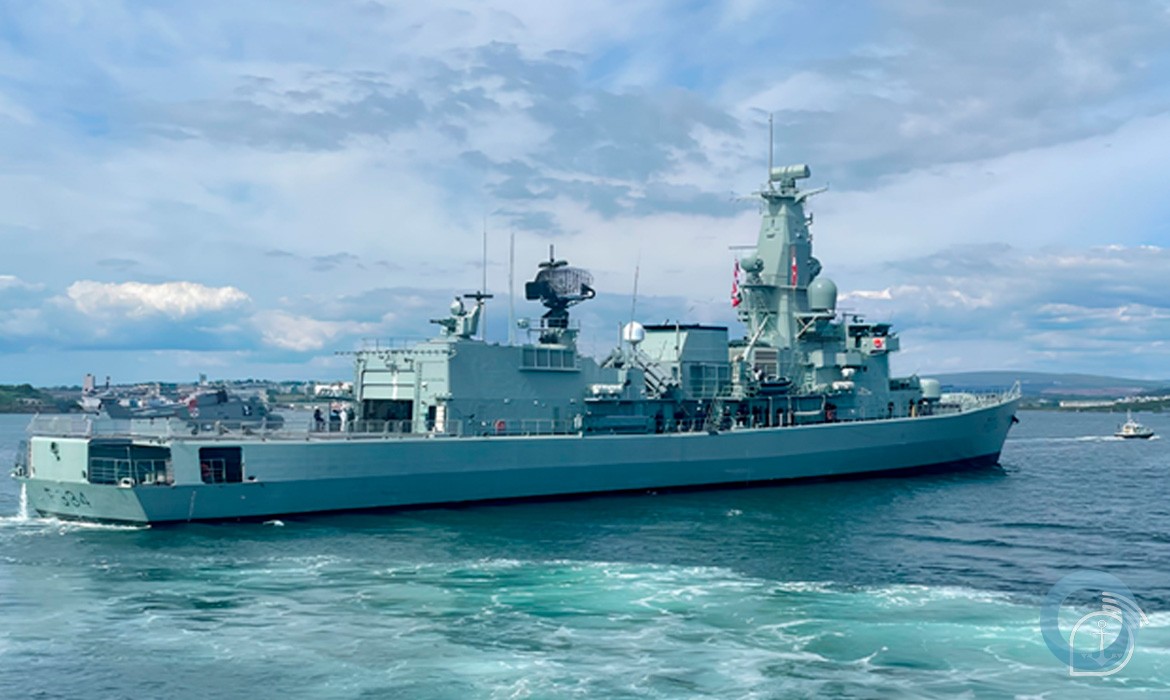It helps the force meet training standards and achieve operational objectives
By Marine News Agency
The doctrinal foundations of the Brazilian Navy (MB) regarding its relationship with other countries are clear: “The navies are not limited to confronting the threats that exist in the sea and river environment” and “although this is their main role, they have traditional support. For foreign policy, establishing strategic partnerships, strengthening the power of the state and through contributions to the country's projection in the international arena.
Through this orientation the MB positions itself as a strategic element of Brazilian foreign policy, known as “naval diplomacy”. In this scenario, the force works in partnership with the United Kingdom Navy (Royal Navy), one of the best training centers is the Naval Operational Standards and Training (Ships) or FOST(S) located in the city. In Plymouth, England.
FOST(S) is a reference in naval training responsible for preparing ships of various navies around the world for complex and high-intensity operations in a global maritime environment.
FOST(S) training programs include: surface warfare exercises, anti-submarine warfare and anti-aircraft warfare, amphibious operations, tactical maneuvers, and emergency or disaster response. Training is essential to ensure that every ship and its crew are prepared for any situation they may encounter at sea, from the need for humanitarian assistance to peacekeeping operations or conflict situations.
One ship trained in FOST(S) is the frigate “Dom Francisco de Almeida” of the Portuguese Navy. For the success of this exercise, Corvette Captain Caio Cesar Camara de Lima of the Brazilian Navy acts as the liaison officer between the Royal Navy and the Portuguese Navy. This role involves direct coordination between the two organizations, ensuring training standards are met and operational objectives are achieved.
The captain of the corvette Câmara explains that FOST(S) is an internationally renowned institution due to its rigor in ensuring the quality of training. “Being the Liaison Officer between FOST(S) and the Portuguese Navy is an honor and responsibility that I face with great dedication. Training here is intense and comprehensive, preparing personnel to face the most varied and complex challenges in naval operations.


Agência Marinha de Notícias (AgMN) interviewed the captain of the Corvette Camara. Check!
AgMN – How did you join FOST(S) and what made this center of excellence in naval training allow a Brazilian officer to join its ranks?
CC Chamber – I joined FOST(S) through a rigorous selection process that included a detailed assessment of my professional history and qualifications. FOST(S) recognizes the importance of international cooperation and the value of having officers from different navies to enrich the exchange of knowledge and practices. My experience in the Brazilian Navy, combined with the specific courses and training I completed, were the deciding factors in my admission to the Center of Excellence.
What are the responsibilities of your position at AgMN – FOST(S)?
CC Chamber – My duties at FOST(S) included supervising and conducting advanced training for warships, evaluating crew performance and executing exercises simulating actual combat situations. I am responsible for ensuring that operational standards are maintained and aligned with international practices.
AgMN – What does it mean for Brazil to serve as an MB soldier in this specialized center?
CC Chamber – Serving in FOST(S) gives great honor to Brazil, demonstrates the capacity and capability of the Brazilian Navy on the international scene, thus strengthening naval diplomacy, opening doors for future cooperation and giving our country a different status. It is proof of the trust and recognition of other countries, raising Brazil's importance in the global context of security and maritime security.
How did the courses you took at AGMN – MP contribute to your performance in this role?
CC Chamber – The courses I took in the Brazilian Navy were the basis for my performance in FOST(S). They provided me with a solid foundation of technical and operational knowledge, as well as leadership and decision-making skills in high-pressure situations. The diversity of training, from combat operations to crisis management, allowed me to adapt and apply these experiences to the challenging environment of FOST(S).
AgMN – How is the training conducted by FOST(S)?
CC Chamber – The training conducted by FOST(S) is divided into two main parts: theoretical and practical. Initially, detailed briefings and TTT (Tabletop Tactics) sessions are conducted, which are discussions and simulations of individual responsibilities in exercises carried out during training.
These theoretical sessions provide a comprehensive understanding of the objectives, procedures and tactics used. After this theoretical preparation, practical exercises are carried out at sea, where teams apply what has been discussed in realistic and challenging scenarios. This integrated approach ensures thorough understanding and ability to effectively apply knowledge in real situations.
How does training offered by AgMN – FOST(S) differ from other naval training elsewhere?
CC Chamber – A distinctive feature of FOST(S) training is its intense focus on realism and perfection. The assessments are rigorous and the exercises are designed to challenge the crew to the maximum, preparing them for any eventuality at sea. A “training for failure” approach allows you to identify and fix weak points, ensuring that teams are prepared to perform in the most adverse situations.
AgMN – Has the Brazilian Navy already participated in any training in FOST(S)?
CC Chamber – Yes, the Brazilian Navy has already participated in exercises in FOST(S). The United Kingdom-built Niterói-class frigates (“Niterói”, “Defensora”, “Constituição” and “Liberal”) were the first MB vessels to participate in exercises with FOST(S) in the 1970s.In 2012 and 2013, three Amazonas-class offshore patrol vessels (“Amazonas “, “Aba” and “Arakuari”) successfully completed FOST(S) training with the Royal Navy. The training was carried out ashore in the United Kingdom and was aimed at preparing personnel to face a variety of operational situations. Participating in this exercise aims to strengthen the cooperation between the Brazilian Navy and the Royal Navy, as well as ensuring that the crews are fully trained to operate the new ships efficiently and safely.
AgMN – Apart from the Portuguese Navy, what other friendly navies have already received this training this year?
CC Chamber – This year, several allied navies, including the navies of Germany, Norway, the Netherlands and Denmark, conducted FOST(S) exercises. Armed conflicts between Ukraine and Russia and armed conflict in the Middle East have increased the need for specialized training as navies seek to better prepare to counter threats and operate in high-tense environments.
AgMN – What is the process for these Marines to participate in this Royal Navy exercise?
CC Chamber – The process for participation in FOST(S) training involves joint planning between the Royal Navy and interested navies. Initially, there is an exchange of information to define specific training objectives. Bilateral and logistical agreements are then made to ensure availability of resources and infrastructure. Finally, a comprehensive schedule of exercises and evaluations has been developed to meet the needs of participating naval forces.
Source: Marine News Agency
